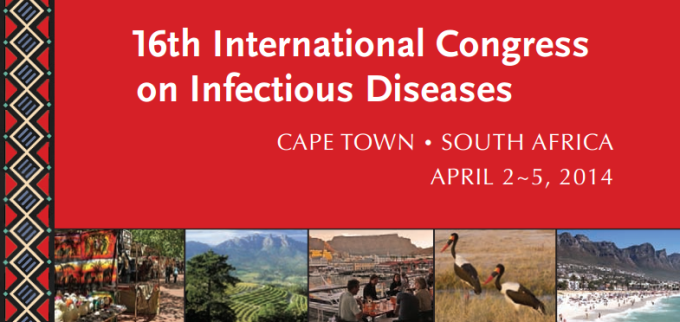Coalition against Typhoid (CaT) members gathered for the 16th International Congress on Infectious Diseases (ICID) in Cape Town, where several individuals presented during the event. Their presentations focused on topics such as assessing the burden of typhoid fever among children, the re-emerging burden of endemic typhoid fever, and potential impact of typhoid conjugate vaccines, as well as updates on current work being done by CaT members.
One of CaT’s newest members, Dr. Deep Thacker, Program Coordinator, IDSurv project, gave a snapshot of the IDSurv project, which aims to develop an early warning system for pediatric infectious diseases in India and generate data on the burden of infectious diseases and adverse events following immunization in India, where the first typhoid conjugate vaccine received national licensure in August 2013.
Deep emphasized the need for typhoid and enteric fever surveillance in India, a country with high disease burden but a lack of nationally representative data, few current case studies on incidence rates and no uniformity of case definition. IDSurv is attempting to change this by providing not only a standard case definition for enteric fever and nine other diseases, but also a real time mobile reporting forum that is capable of sending out email and SMS alerts of outbreaks to all subscribers. As of April 2, 2014, IDSurv estimates that enteric fever constitutes one-fifth of all cases reported.
Despite its innovate nature, the IDSurv project faces a number of challenges such as sporadic reporting, a relatively low number of pediatricians reporting relative to the total number in India, a lack of reporting from some of India’s largest states, and low rate of culture confirmed cases. Deep noted that several steps are being taken to address these issues including integration with the Integrated Disease Surveillance Program, scaling up through training workshops to educate and increase the number of pediatricians reporting, and intensive surveillance in districts under the Presidential Action Plan.
Efforts like IDSurv are critical to increasing awareness around enteric fever which, while a persistent public health problem, is often neglected by public health programs in India and elsewhere in the world due to low mortality rates. Additionally, these surveillance mechanisms have the capacity to help better depict the global burden, which is an integral to the Coalition’s work in advocating for revised global typhoid vaccine policy.
About IDSurv:
The idea of IDsurv.org was conceived by Indian Academy of Pediatrics (IAP) Kutch Branch and was initially supported technically and financially by a Child Health Foundation grant received for “Prevent Pneumonia – Save the Child Campaign” from the Johns Hopkins Bloomberg School of Public Health. IDsurv.org was designed only for the Kutch district, but after interest was shown in this project by IAP COI and CIAP, a memorandum of understanding was signed between IAP Kutch Branch and CIAP to make this project available nationwide for all IAP members. Recently, the project began surveillance for serious adverse events following immunization with the support of the Government of India.



